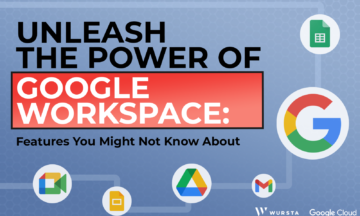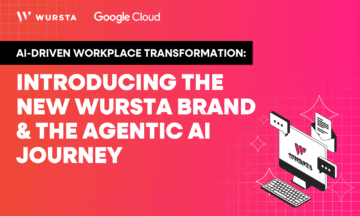Gemini AI vs. ChatGPT for Business

AI isn’t just a buzzword anymore.
Nowadays, AI tools are becoming as essential as email, transforming how we work, communicate, and solve problems in the business world. ChatGPT and Gemini AI stand out as two of the most capable AI assistants available, with each bringing different strengths to the table.
But which of these platforms best aligns with your business needs? Let’s break down what they each have to offer – and help you make an informed decision for your organization.
What Is ChatGPT?
OpenAI’s ChatGPT is practically a household name, becoming the fastest-growing application in history when it launched in late 2022. It’s a generative AI large language model (LLM) that uses natural language processing (NLP) to produce human-like conversational responses – and allows users to direct the conversation toward their preferred length, style, format, language, and level of detail.
Powered by a proprietary series of generative pre-trained transformer (GPT) models, ChatGPT has been fine-tuned to understand context and generate coherent responses based on vast amounts of data. It’s a versatile tool for business tasks like research, synthesis, ideation, writing, design, analysis, and coding – ultimately streamlining workflows and boosting productivity.
One of ChatGPT’s standout features is its GPT store, where users can create and share custom versions of the AI for specific industries and tasks. From designing presentations with Canva to synthesizing insights from 200 million academic papers through Consensus, you can access powerful tools all in one place with ChatGPT.
What Is Gemini AI?
Gemini is a suite of generative AI models that provides users with a smart, adaptable assistant embedded into Google Workspace. Introduced in late 2023, Gemini brings advanced AI capabilities into familiar tools like Gmail, Docs, Sheets, and Slides. This allows users to automate tasks, generate content, and analyze data – all without leaving the Google ecosystem.
Powered by advanced language models and Google’s immense data resources, Gemini can handle multimodal input – such as text and images – with ease, similar to ChatGPT. But Gemini offers image generation and analysis in its free plan (unlike ChatGPT) and is known to create better-quality images, at least for now.
Another advantage? For businesses already using Google’s ecosystem, Gemini integrates smoothly, enhancing productivity without disrupting established workflows. This allows teams to work confidently within the tools they already know.
Data Security and Privacy
When it comes to adopting AI tools, security and privacy are among the top priorities for any business. The good news is that both ChatGPT and Gemini take enterprise security concerns seriously.
For instance, OpenAI does not train its models on any data shared by business users on ChatGPT. Each organization receives its own dedicated workspace with custom data retention policies and domain verification.
To strengthen security, ChatGPT’s enterprise plans offer enhanced user management through SAML Single Sign-On (SSO) and SCIM. Additionally, ChatGPT meets SOC 2 Type 2 compliance standards and maintains encryption at rest and in transit to keep data secure.
For its part, Gemini for Google Workspace operates within Google’s trusted and secure environment, ensuring the same high standards for data privacy and compliance. Users with a Gemini for Google Workspace license get enterprise-grade data protections, and any existing Workspace controls and data handling practices (such as data-regions policies and Data Loss Prevention) are automatically applied across the board.
Interactions with Gemini stay within your organization at all times. Gemini stores any prompts or generated content alongside your Workspace content and never shares them outside your organization. Your submissions and content aren’t used to train models and are never reviewed by humans, either.
With the Gemini app for Android, there’s even the option for on-device processing, where some simpler AI tasks are performed directly on your device, and even offline, ensuring complete privacy.
Trade-offs and Other Considerations
One major difference between ChatGPT and Gemini is that Gemini handles everything within Google’s secure ecosystem, without involving third-party AI providers.
ChatGPT, on the other hand, offers a wide selection of third-party plugins and custom AI instances (collectively called GPTs) in its GPT store. While these GPTs add versatility and functionality to the platform, third-party GPTs may not always meet the same security standards as OpenAI’s in-house models.
Using GPTs is optional, but they’re a significant part of what makes ChatGPT appealing, so businesses should carefully weigh the potential security trade-offs.
Another consideration for businesses is OpenAI’s evolution from a non-profit focused on “safe AGI that is broadly beneficial” to a for-profit benefit corporation seeking investment. Numerous high-level executives have resigned recently as well, raising eyebrows about the company’s internal politics.
Moreover, the restructuring reduces the non-profit board’s control over operations, potentially affecting governance and AI risk management. While this shift could accelerate innovation, some critics argue that it raises questions about OpenAI’s commitment to its original mission of responsible AI development.
Which AI Assistant Is Right for You?
Choosing an AI assistant comes down to how well it integrates with your existing tools and with your business needs overall. In this area, ChatGPT and Gemini offer distinct strengths.
ChatGPT: Flexibility Across Platforms
ChatGPT is platform-agnostic, designed to integrate with a variety of applications like Slack, Salesforce, and custom APIs. This makes it ideal for businesses with diverse tech stacks, since it allows ChatGPT to fit into a wide range of workflows without being tied to any specific ecosystem.
For content-related tasks and customer service applications, ChatGPT can be especially useful – and with a team of skilled developers, you can use the API to build custom integrations for your own workflows, platforms, and unique business needs. That kind of flexibility could be just what you’re looking for.
Gemini: Seamless Integration
On the other hand, Gemini is embedded directly within Google Workspace, maximizing the value of the tools your business may already be using every day. Here are just a few of the ways Gemini can enhance productivity:
- Calendar: Auto-generate meeting agendas and schedule events across teams.
- Gmail: Summarize lengthy email exchanges and generate tailored responses to customer inquiries.
- Meet: Enable real-time translation for seamless multilingual conversations, and summarize auto-generated meeting transcripts.
- Drive: Suggest relevant files and documents to support ongoing projects or meetings.
- Docs: Draft, edit, and refine documents, with AI-assisted suggestions for tone, structure, and formatting.
- Sheets: Provide instant insights and visualizations based on data analysis.
- Slides: Draft presentation slides from prompts and input, incorporating AI-generated charts and images.
Ultimately, the right choice depends on whether your organization values the adaptability of a platform-agnostic tool like ChatGPT or the seamless, in-depth integration that Gemini offers within Google Workspace.
Feature Comparison at a Glance
For a quick overview, let’s compare some specific features of both ChatGPT and Gemini:
| Feature | ChatGPT | Gemini |
| Plans Available | – Gemini Business ($20 per user/month)- Gemini Enterprise ($30 per user/month) | ChatGPT Team ($25-30 per user/month)ChatGPT Enterprise (variable pricing) |
| Visual Processing | – Multimodal processing- Offers additional image-processing tools like DALL-E- Simple video generation with Sora, available on limited basis | – Native multimodal processing- Advanced image generation and analysis- Can interpret and summarize video content |
| Language Capabilities | – Advanced NLP with strong contextual understanding- Multilingual understanding, with real-time translation using ChatGPT Advanced Voice Mode | – Advanced NLP optimized for productivity apps- Multilingual support, including real-time translation of speech integrated into Google apps- Strong context retention |
| Content Creation | – Excellent for text-based content creation- Suited for blogs, reports, customer responses, etc.- Offers research synthesis using custom tools in GPT Store | – Embedded content tools in Docs, Slides, etc.- Provides real-time suggestions for document creation- Strengths in technical and academic writing, with research synthesis and visual-text integration |
| Data Insights and Analysis | – Analyzes and summarizes data from large datasets- Ideal for generating insights with text input | – Built-in data analysis and visualization in Sheets- Offers AI-powered insights for business analytics |
| Customization Options | – GPT Store for creating and sharing customized tools | – Create custom AI ‘experts’ called Gems for specific tasks |
| Development Tools | – Platform-agnostic API for integrating with various apps- Supports third-party APIs | – Minimal additional development options outside Google |
| Team Collaboration | – Supports collaboration through third-party apps- Limited direct collaboration within ChatGPT | – Seamless collaboration within Workspace- Real-time editing in Docs, Sheets, and Slides |
| Enterprise Features | – API supports enterprise-level deployment options- Customizable support for large organizations- Admin controls, domain verification, and analytics | – Advanced meetings with AI note-taking and translated captions in 65+ languages- Automatically classify, label and safeguard sensitive documents with AI- Deep integration with Google’s enterprise security |
| Privacy and Security | – Enterprise-grade security- Customizable data handling for sensitive info; does not train on your data if you are using the Enterprise plan | – Built into Google’s security infrastructure- Ensures compliance and privacy within Workspace |
| Bottom Line | – Versatile across various business tools- Flexible for diverse industries and needs | – Optimized for Google Workspace- Ideal for businesses invested in Google’s productivity tools |
Overall, it’s tough to say which of these AI assistants is truly superior! As Arizona State University computer science professor Subbarao Kambhampati puts it, “We have basically come to a point where most [large language models] are indistinguishable on qualitative metrics.”
Instead, what really matters is how the model has been tuned, trained, and tailored to help you solve specific problems. As we covered, ChatGPT and Gemini each have unique strengths that you can take advantage of in your business – so maybe the best solution is to use both for different purposes.
But for organizations that are already invested in (or plan to adopt) Google Workspace and its suite of tools, we highly recommend Gemini. Its ease of use, security, and integration across the entire Google ecosystem are massive selling points.
Elevate Your Google Workspace Experience with Wursta
Making the most of Gemini for Google Workspace requires more than just rolling it out to your team – but we’ve got you covered!
Wursta’s change management team is here to ensure a smooth and productive launch of Gemini AI, offering a suite of tailored services to guide your organization through the process.
Choose from three options:
- 30-day Guided Trial of Gemini for Google Workspace;
- 6-week Evaluation sprint that dives deeper into discovering your unique AI use cases;
- Ongoing Adoption plan for long-term engagement and support.
We would be thrilled to help make your Gemini rollout a success! Reach out to discover more about Wursta’s professional services and how we can support your organization’s goals.
In the meantime, for a quick look at what Gemini can do, check out our recent on-demand webinar, “Unleash the Power of AI with Google Workspace.”



